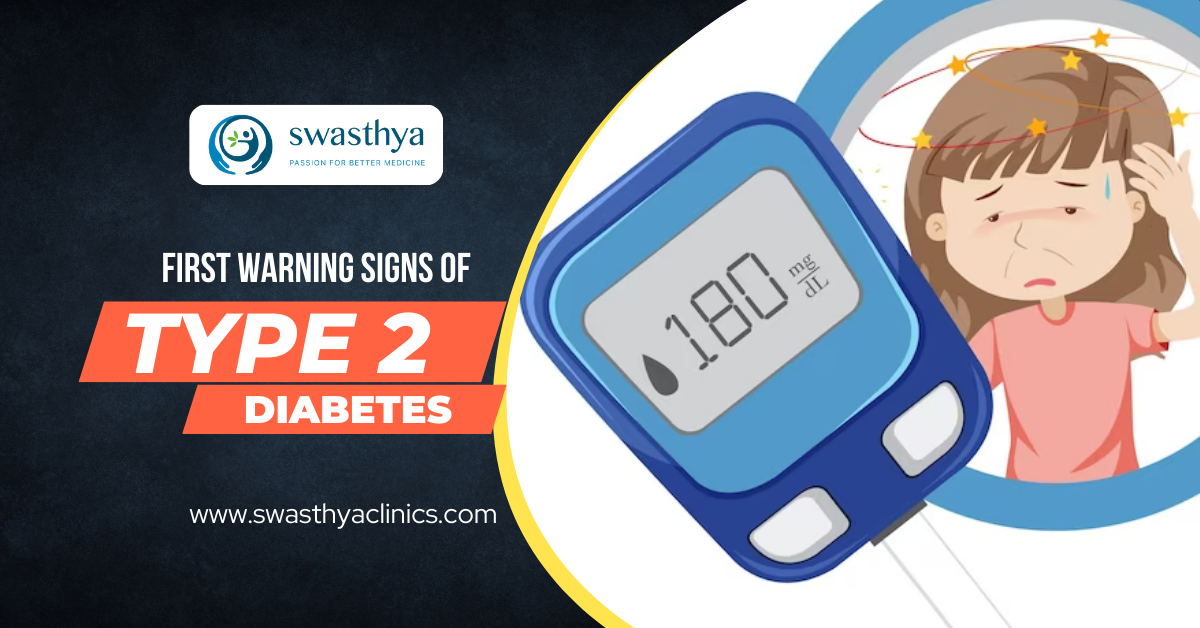-
Mail us
-
Mon to Sat
Call Us now

Book An Appointment
Swasthya Clinic, Jaipur is one of the advanced super-specialty clinics, that provides world-class treatment for asthma, allergy,diabetes, fever, joint pain, headache and migraine, etc. book an appointment now at +91 7300041110.

dr. Rahul Mathur
Associate Consultant - Internal Medicine
MD (Gold Medalist)

Dr. Raman Mathur
Experienced Emergency Physician In Jaipur
MBBS, DNB Emergency Medicine
What Are The First Warning Signs Of Type 2 Diabetes?

- Admin
- Sep 26, 2023
First Warning Signs of Type 2 Diabetes: Type 2 diabetes is a metabolic disorder that affects millions of people worldwide, and its prevalence continues to rise. It often develops gradually, making it essential to recognize its early warning signs.
What are the first warning signs of type 2 diabetes? This is a question that often preoccupies individuals who are concerned about their health. Understanding these initial indicators can be crucial for early diagnosis and effective management of this chronic condition.
If you are someone who is unaware of the first warning signs, don’t worry and keep on reading. In this article we will explore about first warning signs of type 2 diabetes in detail. This will help you to know more about it. So, without further ado, let’s get started!
First Warning Signs of Type 2 Diabetes:
In this section, we will help you to know about the first warning signs of Type 2 diabetes in detail. These are as follows:
1. Frequent Urination (Polyuria):
One of the most common early symptoms of type 2 diabetes is an increased need to urinate. This occurs because the body is trying to eliminate excess sugar through the urine. A person will have a constant feeling that they need to use the loo.
2. Excessive Thirst (Polydipsia):
Increased urination can lead to dehydration, causing persistent thirst. People with type 2 diabetes may find themselves drinking more fluids than usual. You will have an urge to drink more and more and as a result you need to urinate more as well.
3. Unexplained Weight Loss:
Despite increased hunger and eating, some individuals with type 2 diabetes experience unexplained weight loss. This is due to the body's inability to effectively use glucose for energy.
4. Fatigue:
Feeling unusually tired or fatigued is another early sign. When cells can't access glucose for energy, it can lead to persistent feelings of exhaustion.
5. Increased Hunger (Polyphagia):
As the body struggles to regulate blood sugar levels, it may send signals of hunger, even if you've recently eaten. This increased appetite is known as polyphagia.
- Also Read: Early Signs Of Diabetes
6. Blurred Vision:
High blood sugar levels can cause changes in the shape of the eye's lens, leading to blurred vision. This symptom can be temporary but is an important early warning sign.
7. Slow-Healing Wounds:
People with type 2 diabetes may notice that cuts and wounds take longer to heal. High blood sugar levels can impair the body's ability to repair damaged tissue.
8. Frequent Infections:
A weakened immune system due to elevated blood sugar can make individuals with type 2 diabetes more susceptible to infections, such as urinary tract infections, skin infections, or gum disease.
Reach Dr. Rahul Mathur, General Physician in Jaipur for Diabetes Treatment!
If you're dealing with diabetes and seeking expert care, look no further than Dr. Rahul Mathur, a trusted general physician in Jaipur. He's here to help you on your journey towards better health. With his experience and compassionate approach, you can be confident in managing your diabetes effectively. Don't hesitate to reach out to him for guidance, treatment, and support. Your well-being is his priority, and together, you can work towards a healthier, happier life. Take the first step towards a diabetes-free future and connect with Dr. Rahul Mathur today!
FAQ:
1. What are some essential tips to manage type 2 diabetes effectively?
To manage type 2 diabetes, focus on a balanced diet with portion control, regular physical activity, and medication adherence as prescribed by your healthcare provider. Monitor your blood sugar levels, stay hydrated, and prioritize stress management for overall well-being.
2. What role does diet play in managing type 2 diabetes?
A well-balanced diet is crucial. Opt for whole grains, lean proteins, plenty of vegetables, and limited sugar and processed foods. Counting carbohydrates and spreading meals throughout the day can help stabilize blood sugar levels.
3. How can I incorporate exercise into my diabetes management routine?
Regular physical activity is key. Aim for at least 150 minutes of moderate-intensity exercise weekly. Choose activities you enjoy to stay motivated and consult your healthcare team for personalized exercise recommendations.
4. Are there any specific foods I should avoid to better manage my type 2 diabetes?
Minimize sugary beverages, processed snacks, and high-sugar desserts. Limit saturated fats and sodium. Focus on controlling portion sizes, and consult a dietitian for personalized dietary guidance.
5. What should I do if my blood sugar levels become unmanageable despite following these tips?
If your blood sugar levels remain high, consult your healthcare provider. They may need to adjust your medication or treatment plan. Regular communication with your healthcare team is crucial for successful diabetes management.
Also Read:
Book An Appointment
Please feel welcome to contact our friendly reception staff with any general or medical enquiry. Our doctors will receive or return any urgent calls.



